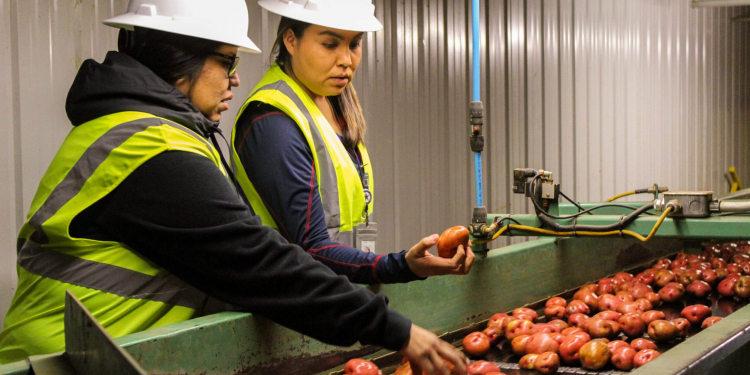NAPI—the Navajo Agricultural Products Industry—isn’t your typical family farm.
For starters, it’s enormous, even by today’s standards of expansion and efficiency: 110,000 acres of cultivated land, with 74,000 of those acres under pivots, all on reservation land. Another of NAPI’s unique attributes is that the enterprise is owned and operated by the Navajo Nation itself, so the number of people dependent on the stewardship of the farm and the land is much higher than that of most operations. And speaking of being higher, all of NAPI’s farmland is situated at well over 5,000 feet in elevation in northwestern New Mexico.
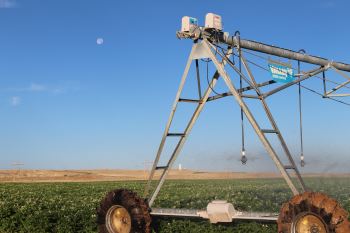
The seeds for what has grown into NAPI were planted a century and a half ago. When the Navajo Nation signed a treaty with the U.S. government in 1868, that treaty included stipulations for the U.S. to provide land and assistance for the Nation to establish a farming operation. Over the ensuing decades, water rights were affirmed, infrastructure was built, in 1970, the Nation established NAPI.
“Early on, the Navajo Nation used NAPI primarily as an employment opportunity for the Navajo people,” says Vincent Cowboy, the current chief operating officer of NAPI. “But as the farm expanded, the vision changed. It became, ‘Now the point of the farm is to make a profit.’ That’s when we started to diversify to so many different crops.”
Among the many crops NAPI grows are alfalfa, feed corn, small grains, beans and, of course, potatoes. The operation also operates three processing facilities—a flour mill, a bean plant and a fresh potato packing shed—that produce high-quality food products under the Navajo Pride brand.
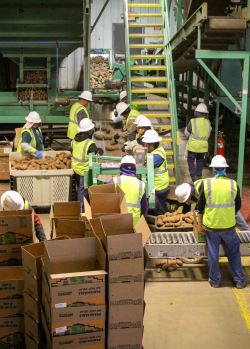
In the 1980s, NAPI grew some 6,000 acres of potatoes for the fresh and chipping markets. Today, that number is down to around 550 acres of organically grown russet, red and yellow potatoes for the fresh market. (NAPI also grows other organic crops, including some of its corn, wheat, melons and squash.) Aaron Benally is NAPI’s director of organic crops and has overseen all potato business, from planting to the packing shed to sales, since 1984.
“Our potato acres—and our other crop acres—are simply based off our marketing forecast,” he says. “We have agronomists and marketers on staff who help develop a strategic five-year plan. We use those forecasts to inform what our market demand is and how much we can move profitably.”
“The farm is self-sufficient,” says Cowboy. “Any profit is returned to the farm for infrastructure, water, pivots, irrigation and the staff. Anything we’re doing is based off the market and what our customers need, rather than growing for the sake of growth.
“What really drives our company,” Cowboy continues, “is the expertise. We have a lot of people with over 35 years’ worth of experience on the farm. A lot of individuals, like Aaron, have that experience and pride and have made the company from the small farm it was to what it is today.”
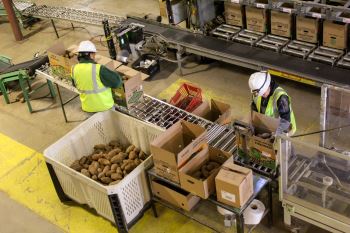
Through its scholar program with New Mexico State University and partnerships with local 4-H and FFA chapters, NAPI reaches out to the rising generation to keep locally grown talent and passion close to home.
“We try to get them while they’re still playing in the dirt,” says Cowboy. “Their incentive to come work with us is to keep playing in the dirt. We’re trying to capture that passion. Because there’s no other farm on the reservation, we have to teach these young people to apply their passion to farming.”
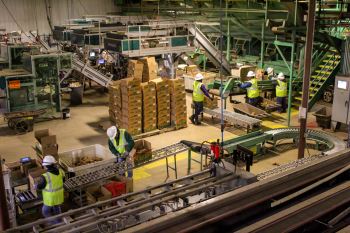
During the peak harvest season in the early fall, NAPI will employ as many as 600 people; there are nearly 300 permanent, full-time employees on the farm. Over the years, NAPI has proven to be a major boon to the Nation’s local economy, creating a lot of resources and a lot of stable jobs.
“We treat each other like family,” says Cowboy. “This place is operated by Navajos, structured by Navajos, on Navajo land. That same pride exists as a privately owned company might have.”
On second thought, NAPI really isn’t all that different from any of thousands of family farms across the country. A family farm is exactly what it is.

